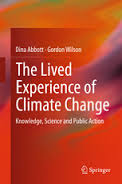The Lived Experience of Climate Change: Knowledge, Science and Public Action

This book discusses the understanding of everyday lived experiences in regard to the ideas and realities of climate change, and particularly efforts to reduce carbon emissions, in order to explore potential patterns of individual and collective responses.
The authors build their arguments with extensive discussions. They start with basic questions of epistemologies and ontologies related to climate change adaptation and mitigation. These are illustrated with many examples and case studies in the form of boxes as well as several rich and complex narratives that reveal the specific cultural, historical, geographical and even personal contexts.
A central question throughout the book is the qualitative and often anecdotal underlying data of lived experiences. Whose knowledge counts beyond the powerful discourse of social and natural sciences? And how can one engage and reflect on the experiences of climate change in the context of different societies and societal relationships?
Chapter 5 critically examines how local knowledge can be interpreted as a manifestation of lived experience, where it provides opportunities such as demonstrating which actions work on the ground and that people are not passive victims but have agency and actively respond to climate change. However, there are severe challenges – related, for example, to existing power relations between experts and laypeople. Institutionalizing lived experience into national and local authorities, as described in Chapter 10, would have to deal with the management of multiple tensions. But the authors argue that particularly in low-income countries with low adaptation budgets, it could also be “…a way of finding out about local “below the radar” innovations that vulnerable people and communities across the world are making to adapt now to climate change that is already affecting them” (p.233).
Lived experiences emphasize the social components of climate change that can be added to the physical impacts. They bring a diversity of citizens’ voices and interests into stakeholder processes that shape public action and highlight that nobody is absolutely powerless in addressing climate change. They also show abilities to cross knowledge boundaries through developing a trans-boundary social imagination in the climate change arena.
Book note prepared by Julia Wesely
Search the Book notes database
Our Book notes database contains details and summaries of all the publications included in Book notes since 1993 - with details on how to obtain/download.
Use the search form above, or visit the Book notes landing page for more options and latest content.
For a searchable database for papers in Environment and Urbanization, go to http://eau.sagepub.com/

